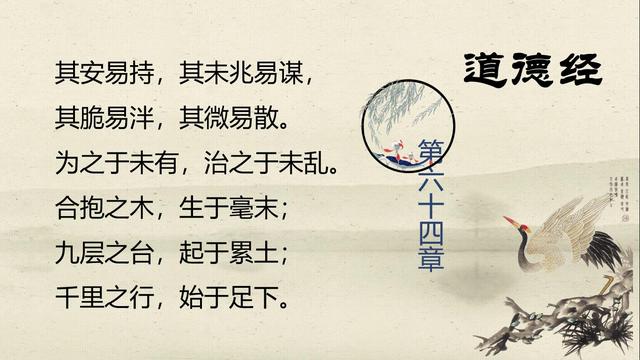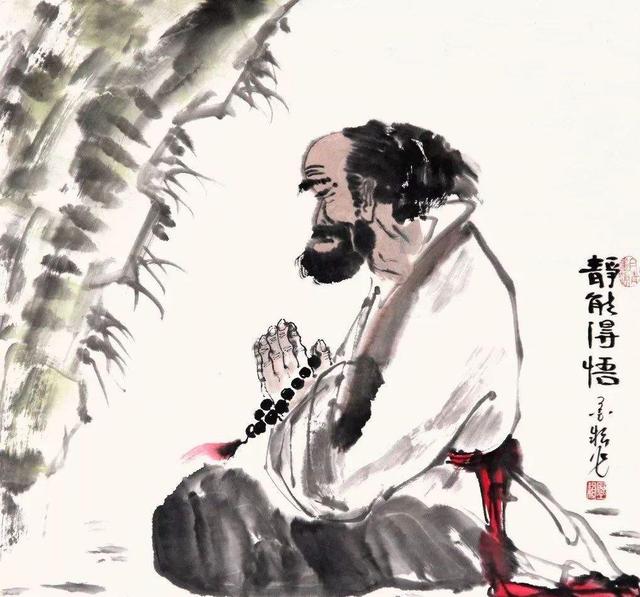
| 64 | 道德經: |
其安易持,其未兆易謀。
其脆易泮,其微易散。
為之於未有,治之於未亂。
合抱之木,生於毫末;九層之臺,起於累土;千里之行,始於足下。
為者敗之,執者失之。
是以聖人無為故無敗;無執故無失。
民之從事,常於幾成而敗之。
慎終如始,則無敗事,是以聖人欲不欲,不貴難得之貨;學不學,復衆人之所過,以輔萬物之自然,而不敢為。
|
| Dao De Jing: |
(Guarding the minute)
That which is at rest is easily kept hold of; before a thing has given indications of its presence, it is easy to take measures against it; that which is brittle is easily broken; that which is very small is easily dispersed. Action should be taken before a thing has made its appearance; order should be secured before disorder has begun.
The tree which fills the arms grew from the tiniest sprout; the tower of nine storeys rose from a (small) heap of earth; the journey of a thousand li commenced with a single step.
He who acts (with an ulterior purpose) does harm; he who takes hold of a thing (in the same way) loses his hold. The sage does not act (so), and therefore does no harm; he does not lay hold (so) and therefore does not lose his bold. (But) people in their conduct of affairs are constantly ruining them when they are on the eve of success. If they were careful at the end, as (they should be) at the beginning, they would not so ruin them.
Therefore the sage desires what (other men) do not desire, and does not prize things difficult to get; he learns what (other men) do not learn, and turns back to what the multitude of men have passed by. Thus he helps the natural development of all things and does not dare to act (with an ulterior purpose of his own).
|


Dao De Jing Chapter 64 - Seddon
Jan 15 at 2:32 AM
64
Things which keep still are easy to hold.
Events yet to happen are easy to plan.
Fragile things are easy to break.
Small things are easy to lose.
Deal with things before they happen.
Put things in order before chaos sets in.
A tree as big as a man's embrace grows from a tiny shoot;
A nine-storey terrace begins as a mound of earth;
A journey of a thousand miles starts with the first step.
Those who take action, fail.
Those who grasp for things, lose them.
Therefore the Sage takes no action, yet never fails;
He grasps for nothing, yet never loses.
In managing their affairs people often fail at the point of success.
So attend carefully to the end as much as to the beginning,
And there will be no failure.
Therefore the Sage desires to be free from desire.
He does not prize rare treasures.
He learns to unlearn his learning,
And he brings the people back to what they have lost.
Thus he furthers the natural completion of the Ten Thousand Things,
And refrains from acting.
Things which keep still are easy to hold.
Events yet to happen are easy to plan.
Fragile things are easy to break.
Small things are easy to lose.
Deal with things before they happen.
Put things in order before chaos sets in.
A tree as big as a man's embrace grows from a tiny shoot;
A nine-storey terrace begins as a mound of earth;
A journey of a thousand miles starts with the first step.
Those who take action, fail.
Those who grasp for things, lose them.
Therefore the Sage takes no action, yet never fails;
He grasps for nothing, yet never loses.
In managing their affairs people often fail at the point of success.
So attend carefully to the end as much as to the beginning,
And there will be no failure.
Therefore the Sage desires to be free from desire.
He does not prize rare treasures.
He learns to unlearn his learning,
And he brings the people back to what they have lost.
Thus he furthers the natural completion of the Ten Thousand Things,
And refrains from acting.

第六十四章
[原文]
其安易持,其未兆易谋;其脆易泮①,其微易散。为之于未有,治之于未乱。合抱之木,生于毫末②;九层之台,起于累土③;千里之行,始于足下。为者败之,执者失之④。是以圣人无为故无败,无执故无失⑤。民之从事,常于几成而败之。慎终如始,则无败事。是以圣人欲不欲,不贵难得之货,学不学⑥,复众人之所过,以辅万物之自然而不敢为⑦。
[译文]
局面安定时容易保持和维护,事变没有出现迹象时容易图谋;事物脆弱时容易消解;事物细微时容易散失;做事情要在它尚未发生以前就处理妥当;治理国政,要在祸乱没有产生以前就早做准备。合抱的大树,生长于细小的萌芽;九层的高台,筑起于每一堆泥土;千里的远行,是从脚下第一步开始走出来的。有所作为的将会招致失败,有所执着的将会遭受损害。因此圣人无所作为所以也不会招致失败,无所执着所以也不遭受损害。人们做事情,总是在快要成功时失败,所以当事情快要完成的时候,也要像开始时那样慎重,就没有办不成的事情。因此,有道的圣人追求人所不追求的,不稀罕难以得到的货物,学习别人所不学习的,补救众人所经常犯的过错。这样遵循万物的自然本性而不会妄加干预。
[注释]
1、其脆易泮:泮,散,解。物品脆弱就容易消解。
2、毫末:细小的萌芽。
3、累土:堆土。
4、为者败之,执者失之:一说是二十九章错简于此。
5、是以圣人无为故无败,无执故无失:此句仍疑为二十九章错简于本章。
6、学:这里指办事有错的教训。
7、而不敢为:此句也疑为错简。
[延伸阅读1]王弼《道德经注》
其安易持,其未兆易谋,
以其安不忘危,持之不忘亡,谋之无功之势,故曰易也。
其脆易浮,其微易散。
虽失无入有,以其微脆之故,未足以兴大功,故易也。此四者,皆说慎终也。不可以无之故而不持,不可以微之故而弗散也。无而弗持,则生有焉;微而不散,则生大焉。故虑终之患如始之祸,则无败事。
为之于未有,
谓其安未兆也。
治之于未乱。
谓微脆也。
合抱之木,生于毫末;九层之台,起于累土;千里之行,始于足下。为者败之,执者失之。
当以慎终除微,慎微除乱,而以施为治之,形名执之。反生事原,巧辟滋作,故败失也。
是以圣人无为,故无败;无执,故无失。民之从事,常于几成而败之。
不慎终也。
慎终如始,财无败事。是以圣人欲不欲,不贵难得之货;
好欲虽微,争尚为之兴。难得之货虽细,食盗为之起也。
学不学,复众人之所过,
不学而能者,自然也。喻于不学者#2,过也。故学不学,以复众人之所过。
以辅万物之自然而不敢为。
[延伸阅读2]苏辙《老子解》
其安易持,其未兆易谋,其脆易浮,其微易散。为之于未有,治之于未乱。
方其未有,持而谋之足矣。及其将然,非浮而散之不去也,然犹愈于既成也。故为之于未有者上也,治之于未乱者次也。
合抱之木,生于毫末;九层之台,起于累土;千‘里之行,始于足下。为者败之,执者失之,是以圣人无为,故无败;无执,故无失。
治乱祸福之来,皆如彼三者。积小以成大,圣人持之以无为,守之以无执,秘能使根自生,使祸自亡。譬如种苗,深耕而厚耔之,及秋自秾。譬如被盗,危坐而熟视之,盗将自那。世人不知物之自然,以为非为不成,非执不留,故常与祸争胜,与福争赘#1,是以祸至于不救,福至于不成,盖其理然也。
民之从事,常于鹦成而败之,慎终如始,则无败事。
圣人知有为之害,不以人助天,始终皆因其自然,故无不成者。世人心存于得丧,方事之微,犹有不知而听其自然者,及见其几成而重失之,则未有不以为败之者矣。故曰慎终如始,则无败事。
是以圣人欲不欲,不贵难得之货;学不学,复众人之所过。以辅万物之自然,而不敢为。
人皆徇其所歌以伤物,信其所学以害理。圣人非无歌也,歌而不欲,故虽欢而不伤于物。非无学也,学而不学,故虽学而不害于理。然后内外空明,廓然无为,可以辅万物之自然,而待其自成矣。


河上公-老子道德經
事必作於細是以聖人終不為大〈處謙虚也〉故能成
其大〈天下共歸之也〉夫輕諾必寡信〈不重言也〉多易必多難
〈不愼患也難乃旦反〉是以聖人猶難之〈聖人動作舉事猶進退重難之欲塞其源〉故
終無難〈聖人終身无患難之事猶避害𭰹也〉
守微第六十四
其安易持〈治身治國安靜者易守持也〉其未兆易謀〈情欲禍患未有形兆時易〉
〈謀正也〉其脆易破〈禍亂未動於朝情欲未見於色如脆弱易破除脆七歳反〉其微易散
〈其未彰著微小易散去也〉為之於未有〈欲有所為當於未有萌牙之時塞其端也〉治之於
未亂〈治身治國於未亂之時當豫閉其門也〉合抱之木生於毫末〈從小〉
〈成大〉九層之臺起於累土〈從卑至髙〉千里之行始於
No comments:
Post a Comment